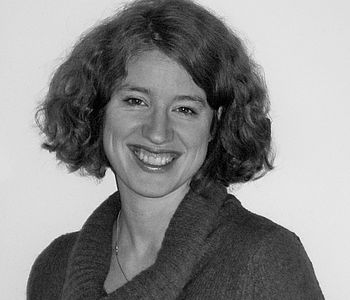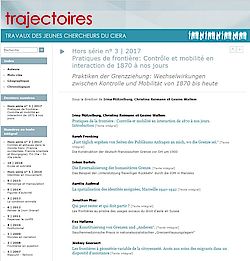Gesine Wallem | Doktorandin
Ehemaliges Mitglied
Mutterinstitut
:
CERI, Sciences Po Paris
|
Fachbereich
:
Politikwissenschaft
,
Soziologie
|
Stipendium
Contrat doctoral, Sciences Po Paris
Titel der Dissertation
Doing "Russian Germanness": Die Aushandlung von nationaler Zugehörigkeit bei Aussiedlermigrant_innen aus der ehemaligen Sowjetunion (Arbeitstitel)Zusammenfassung der Dissertation
The aim of this research is to examine the relationship between official state categorization and ethnic self-identification of migrants. This analysis is conducted on the basis of a specific type of migration, the so-called "ethnic German migrations". The particularity of this migration from the former Soviet Union ist that immigrants obtain the German citizenship on the basis of their ethnic origin. In contrast to other migrants, they are thus not defined as foreign immigrants by the receiving state, but as co-ethnics “returning” to their ancestral homeland, a nation they ostensibly always belonged to. On the other hand, however, migrants mostly “return” to a country they have never lived in before. As a consequence of assimilation and generational change, most of the co-ethnic migrants have been socialized in a Russian-speaking, Soviet environment. There thus seems to be a discrepancy between an official categorization as "Germans" and a "lived experience" as "Russian", "foreigner" or "immigrant". To what extent is the official category of "Germanness" made meaningful in social interactions? How are the symbolic boundaries between "citizens" and "foreigners", between "Germans" and "non-Germans" negotiated by ethnic German migrants?
The analysis is based on the ethnomethodological approach of "doing difference" which has been developed in the context of gender studies (West & Zimmermann 1987,West & Fenstermaker 1995). Within a perspective in terms of “practical nationality” (Hage 1998), I propose to look at the methods or practices through which ethnicity or nationhood is “done”, performed, and accomplished in social interactions. This focus on the “doings” of national identities allows me to analyze the ways through which national or ethnic categories are invoked, mobilized, but also unconsciously displayed in social interactions. In this sense, the relationship between categorization and appropriation, between external definition and internal self-identification is to be understood as a “contact zone” or “arena” in which heterogeneous actors with different power relationships negotiate national belonging. (Oltmer 2009). Through this interactionist, multi-level perspective, the subtle relationship between state categorization and individual identification shall be analyzed as a dynamic co-production of national identities.
Within the scope of this thesis, three dimensions of the “doings” of national identities shall be taken into consideration. The first dimension concerns the legal and administrative practices of national categorization and appropriation. In a perspective of “street level bureaucracy” (Lipsky 1980, Spire 2008), the idea is to examine the bureaucratic practices through which administrative officers make use of national categories in their daily routines, and the ways they are appropriated by Aussiedler applicants. This part of the analysis is based on ethnographic observation and semi-structured interviews at the administrative unit of the admission camp of Friedland/Lower Saxony. The second dimension refers to the political practices through which ethnic or national categories are mobilized and invoked by ethno-political entrepreneurs. Within this perspective, the aim is to show how political actors, party leaders, activists and leaders of associations make use of national categories in political projects to invest them with symbolic meaning. This part of the analysis relies on ethnographic observations and interviews in Aussiedler associations in different districts of Berlin. Finally, the third dimension shall be concerned with cultural practices through which national identities are performed during “ethnic” events, festivals, and get-togethers. In this part, I draw on ethnographic observations and informal interviews at different kinds of cultural festivals and events, to examine how a sense of national belonging is conveyed, negotiated and recreated through these performances on stage.
Betreuer
Organisation von Veranstaltungen
1.-2. Oktober 2015: Organisation der Tagung: "Migration und Grenzen: Grenzkonstruktion als soziale und administrative Praxis, von 1880 bis heute" - Junges Forum, Centre Marc Bloch (mit Christina Reimann und Irina Mützelburg)
Aktivitäten
Ko-Organisatorin der Forschungsgruppe "Migration und Gesellschaft" am Centre Marc Bloch (zusammen mit Dr. Leyla Dakhli und Prof. Catherine Gousseff, seit Oktober 2015)
Hors-série de la revue Trajectoires: "Pratiques de frontière"
21.Juli 2017Irina Mützelburg , Christina Reimann , Gesine Wallem
Le Hors-série n°3 (2017) de la revue en ligne Trajectoires (CIERA) vient de paraître sous le titre:
Pratiques de frontière: Contrôle et mobilité en interaction de 1870 à nos jours
Praktiken der Grenzziehung: Wechselwirkungen zwischen Kontrolle und Mobilität von 1870 bis heute
Ce numéro a été coordonné par Irina Mützelburg, Dr. Christina Reimann et Gesine Wallem. Les contributions sont le fruit du Junges Forum organisé en octobre 2015 sur le thème « Migrations et frontières : La construction de frontières par des pratiques administratives et sociales (des années 1880 à nos jours) ».
Accès au dossier : https://trajectoires.revues.org/2338
Contenu du numéro:
- Irina Mützelburg, Christina Reimann et Gesine WallemPratiques de la frontière : Contrôle et mobilité en interaction de 1870 à nos jours. Introduction [Texte intégral]
- Sarah Frenking„Fast täglich ergehen von Seiten des Publikums Anfragen an mich, wo die Grenze sei.“ [Texte intégral]Die Konstruktion der deutsch-französischen Grenze vor Ort um 1900
- Inken BartelsDie Externalisierung der humanitären Grenze. [Texte intégral]Das Beispiel der ‚Unterstützung freiwilliger Rückkehr‘ durch die IOM in Marokko
- Aurélie AudevalLa spatialisation des identités assignées, Marseille 1940-1942 [Texte intégral]
- Jonathan MiazQui peut rester et qui doit partir ? [Texte intégral]Les frontières au prisme des usages sociaux du droit d’asile en Suisse
- Eva HallamaSeuchenmedizinische Praxis in nationalsozialistischen „Grenzentlausungslagern“
- Jérémy GeeraertLes frontières à géométrie variable de la citoyenneté. Accès aux soins des migrants dans un dispositif d’assistance [Texte intégral]
